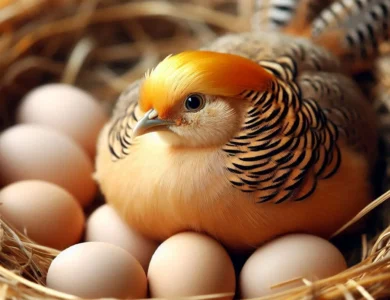Can You Eat Golden Pheasant Eggs?

Introduction
Golden pheasants are beautiful birds known for their vibrant plumage and unique appearance. While these birds are primarily kept for ornamental purposes, you might wonder about their eggs. This article will explore whether golden pheasant eggs are edible and what you need to know about them.
What Are Golden Pheasants?
Golden pheasants, scientifically known as Chrysolophus pictus, are native to the mountainous regions of central and western China. These birds are members of the pheasant family and are known for their striking appearance.
Physical Characteristics
Golden pheasants have a distinctive look:
- Males have a golden-yellow crest with a red body
- Females are less colorful, with a mottled brown plumage
- They typically weigh between 500-700 grams
- Their body length ranges from 90-105 cm
Habitat and Behavior
In the wild, golden pheasants prefer:
- Dense forests and woodlands
- Areas with thick undergrowth
- Elevations between 600-4,000 meters
These birds are generally shy and elusive in their natural habitat. They spend most of their time on the ground, foraging for food and only fly for short distances when necessary.
Golden Pheasant Eggs
Golden pheasant eggs are not as well-known as chicken or duck eggs, but they do have some interesting characteristics.
Physical Appearance
Golden pheasant eggs have some unique features:
- They’re smaller than chicken eggs, about the size of a large quail egg
- The shell color is usually pale buff or light brown
- They may have small speckles or spots
Laying Habits
Understanding the laying habits of golden pheasants can help you know what to expect if you’re considering raising these birds:
- Females typically lay 8-12 eggs per clutch
- The laying season usually starts in April and can continue through summer
- Incubation period is about 22-23 days
Can You Eat Golden Pheasant Eggs?
Now, let’s address the main question: can you eat golden pheasant eggs?
Edibility
Yes, golden pheasant eggs are edible. Like other bird eggs, they’re a good source of protein and nutrients. However, there are some factors to consider:
- They’re not commonly consumed due to their small size and relative scarcity
- The taste is similar to chicken eggs but with a slightly richer flavor
- They’re often considered a delicacy in some cultures
Nutritional Value
While specific nutritional data for golden pheasant eggs is limited, we can make some general assumptions based on other pheasant eggs:
- High in protein
- Rich in vitamins A, D, and E
- Good source of minerals like iron and selenium
- Lower in cholesterol compared to chicken eggs
Safety Considerations
If you’re planning to eat golden pheasant eggs, keep these safety tips in mind:
- Only eat eggs from birds raised in captivity, not wild eggs
- Ensure the eggs are fresh and properly stored
- Cook the eggs thoroughly to reduce the risk of foodborne illness
Raising Golden Pheasants for Eggs
If you’re interested in having a regular supply of golden pheasant eggs, you might consider raising these birds yourself.
Housing Requirements
Golden pheasants need specific housing conditions:
- Large enclosures with plenty of space to move
- Shelter from extreme weather conditions
- Perches at various heights
- Dense vegetation or artificial cover for security
Feeding
A proper diet is crucial for healthy birds and good egg production:
- Commercial game bird feed as a base diet
- Supplemental fruits and vegetables
- Fresh, clean water available at all times
- Grit for proper digestion
Egg Collection
If you’re raising golden pheasants for eggs, follow these guidelines:
- Collect eggs daily to ensure freshness
- Clean eggs gently with a dry cloth if necessary
- Store eggs in a cool place, ideally between 50-60°F (10-15°C)
Cooking with Golden Pheasant Eggs
If you have access to golden pheasant eggs, you might wonder how to use them in cooking.
Preparation Methods
Golden pheasant eggs can be prepared in various ways:
- Boiled (soft or hard)
- Fried
- Scrambled
- Used in baking recipes
Remember that due to their small size, you might need to use more eggs than you would with chicken eggs in recipes.
Recipe Ideas
Here are some ideas for using golden pheasant eggs:
- Mini deviled eggs as an appetizer
- Quiche with golden pheasant eggs and vegetables
- Egg salad with a gourmet twist
- Pasta carbonara using golden pheasant eggs for richness
Comparison to Other Eggs
To better understand golden pheasant eggs, let’s compare them to some other common types of eggs.
Chicken Eggs
Chicken eggs are the most commonly consumed eggs worldwide:
- Larger than golden pheasant eggs
- Widely available and affordable
- Neutral flavor that works well in many recipes
Quail Eggs
Quail eggs are similar in size to golden pheasant eggs:
- Often used in gourmet cooking
- Have a higher yolk-to-white ratio
- Mild flavor with a slight gamey note
Duck Eggs
Duck eggs are larger and richer than chicken eggs:
- Higher fat content
- Often preferred for baking due to their richness
- Stronger flavor compared to chicken eggs
Cultural Significance
Golden pheasants and their eggs have cultural significance in some parts of the world.
In Chinese Culture
Golden pheasants hold a special place in Chinese culture:
- Considered symbols of beauty and good fortune
- Often depicted in traditional art and literature
- Their feathers were used in traditional costumes
As a Delicacy
In some regions, golden pheasant eggs are considered a delicacy:
- Prized for their rarity and unique flavor
- Sometimes used in traditional medicine
- Featured in high-end restaurants in some Asian countries
Conservation Status
While we’re discussing eating golden pheasant eggs, it’s important to consider the conservation status of these birds.
Wild Populations
Golden pheasants in the wild:
- Are listed as a species of Least Concern by the IUCN
- Have a stable population in their native range
- Face some threats from habitat loss and hunting
Captive Breeding
Many golden pheasants are bred in captivity:
- For ornamental purposes
- In zoos and wildlife parks
- By hobbyists and bird enthusiasts
It’s important to note that eggs for consumption should only come from captive-bred birds, not wild populations.
Legal Considerations
Before deciding to raise or consume golden pheasant eggs, be aware of the legal aspects.
Ownership Regulations
Regulations on keeping golden pheasants vary by location:
- Some areas require permits to keep these birds
- There may be restrictions on the number of birds you can keep
- Check local laws before acquiring golden pheasants
Selling Eggs
If you’re considering selling golden pheasant eggs:
- Check local regulations on selling poultry products
- You may need special permits or licenses
- Ensure you’re following food safety guidelines
Ethical Considerations
When considering eating golden pheasant eggs, it’s worth thinking about the ethical implications.
Animal Welfare
Consider the welfare of the birds:
- Ensure they have proper living conditions
- Avoid overcrowding or stress
- Provide a diet that meets their nutritional needs
Environmental Impact
Think about the environmental aspects:
- Captive breeding can help reduce pressure on wild populations
- Consider the resources required to raise these birds
- Compare the environmental impact to other egg sources
Alternatives to Eating Golden Pheasant Eggs
If you’re interested in golden pheasants but not necessarily in eating their eggs, consider these alternatives:
Keeping as Pets
Golden pheasants can make interesting pets:
- They’re beautiful to observe
- Can be kept in outdoor aviaries
- Require specific care and attention
Photography and Birdwatching
Appreciate golden pheasants without consuming their eggs:
- Visit zoos or wildlife parks that house these birds
- Participate in birdwatching trips to their native habitats
- Engage in wildlife photography
Future of Golden Pheasant Egg Consumption
Looking ahead, what might the future hold for golden pheasant egg consumption?
Potential Growth
There could be increased interest in golden pheasant eggs:
- As people seek out unique culinary experiences
- If they become more widely available through specialized farming
- As part of the growing interest in heritage and rare breeds
Challenges
However, there are challenges to widespread consumption:
- Limited availability compared to other egg types
- Higher cost due to specialized care requirements
- Lack of public awareness about these eggs
Conclusion
Golden pheasant eggs are indeed edible and can be a unique addition to your culinary experiences. They offer a similar nutritional profile to other eggs but with a distinctive flavor and the appeal of rarity. However, it’s important to consider the ethical, legal, and practical aspects of obtaining and consuming these eggs.
If you’re interested in trying golden pheasant eggs, make sure to source them from reputable breeders who prioritize animal welfare. Always follow proper food safety guidelines when handling and preparing the eggs.
Whether you choose to eat golden pheasant eggs or simply appreciate these beautiful birds from afar, learning about them can deepen your understanding of the diverse world of poultry and egg production.
FAQs
Are golden pheasant eggs safe to eat?
Yes, golden pheasant eggs are safe to eat when properly handled and cooked. As with any egg, it’s important to ensure they’re fresh and from a reliable source.
How do golden pheasant eggs taste compared to chicken eggs?
Golden pheasant eggs have a flavor similar to chicken eggs but are often described as slightly richer or more intense.
Can I hatch golden pheasant eggs instead of eating them?
Yes, if the eggs are fertilized, you can attempt to hatch them. This requires specific incubation conditions and care for the chicks.
How many golden pheasant eggs equal one chicken egg in recipes?
Due to their smaller size, you might need 2-3 golden pheasant eggs to replace one standard chicken egg in recipes.
Where can I buy golden pheasant eggs?
Golden pheasant eggs are not commonly available in regular stores. You might find them through specialty poultry farmers, exotic bird breeders, or at farmers’ markets in some areas.




